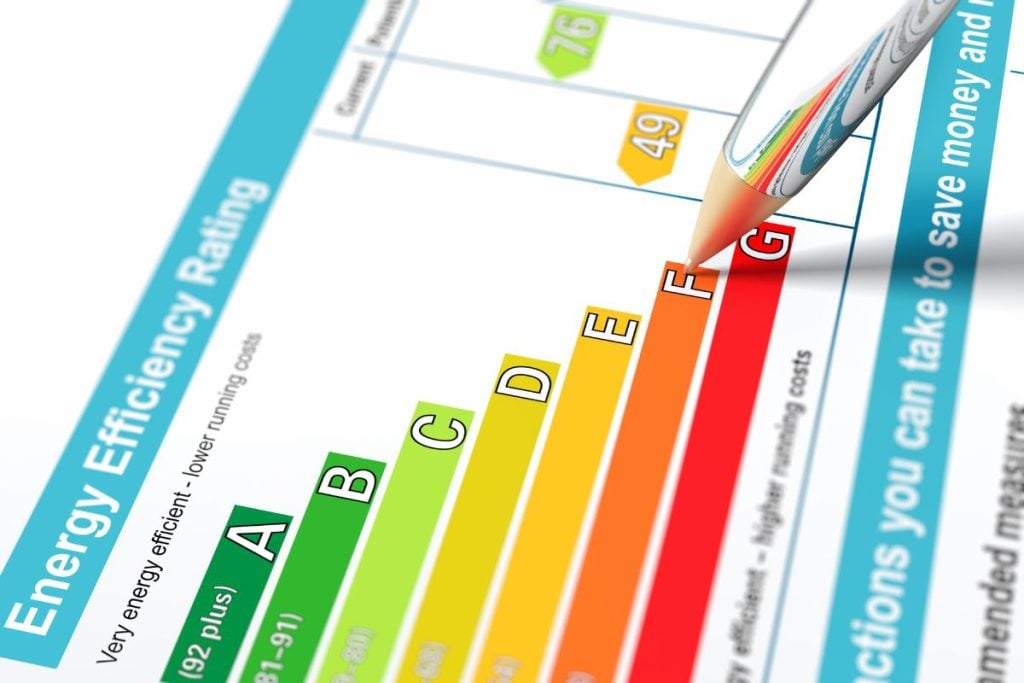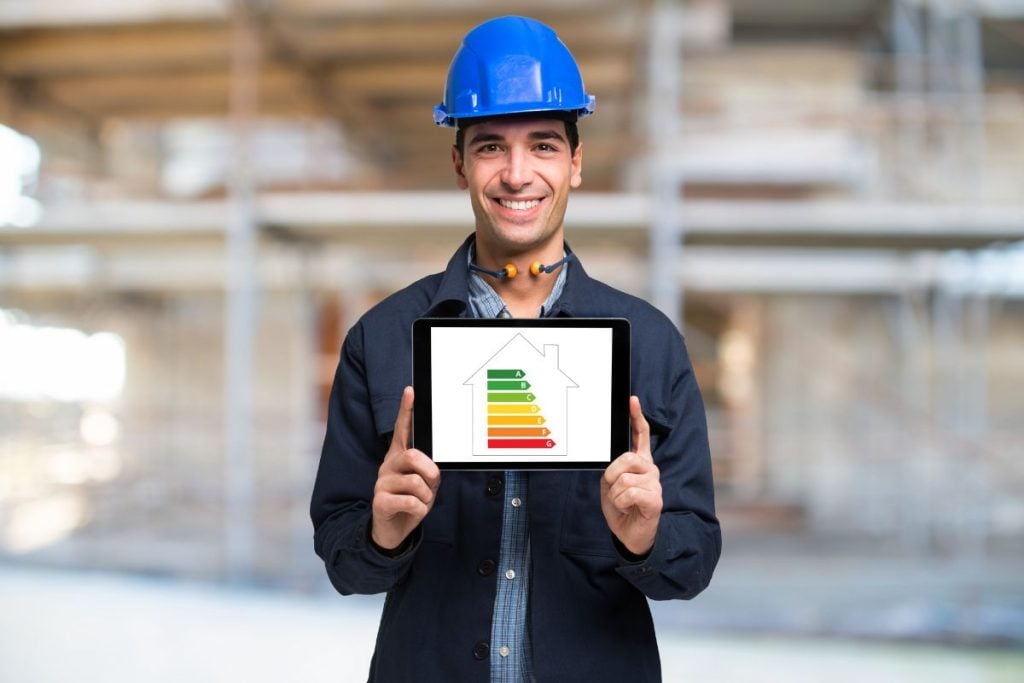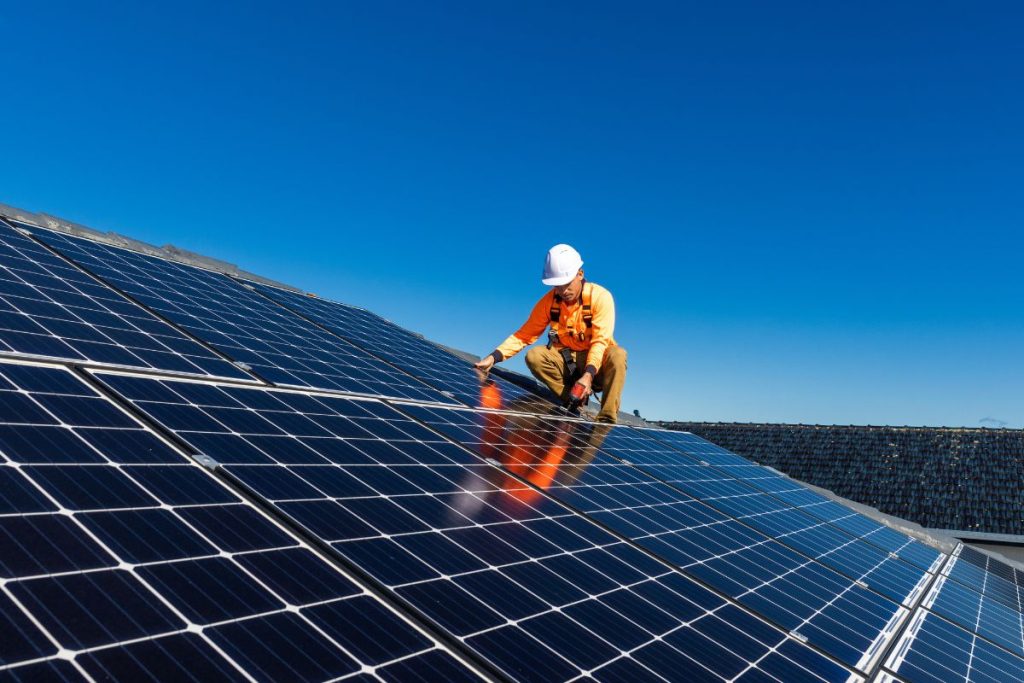With the government set to tighten energy efficiency requirements for commercial properties in the coming years, businesses need to act to ensure their buildings meet higher EPC standards. Failing to improve energy performance could affect leasing potential, operational costs, and long-term compliance.
Improving your commercial property’s energy efficiency helps you stay ahead of regulations reduce energy bills, lower your carbon footprint, and strengthen your sustainability credentials.
A key way to measure this is through your Energy Performance Certificate (EPC) rating, which scores a building from A (highly efficient) to G (inefficient), highlighting potential improvements.
Installing solar panels is one of the most effective ways to boost your EPC rating. By generating renewable electricity on-site, solar PV reduces reliance on the grid, cuts costs, and contributes to a greener operation.
In this post, we’ll break down how EPC ratings are calculated, explain when your commercial property may need energy efficiency improvements, and how solar panels can help your building achieve maximum efficiency.
Understanding EPC Ratings for Commercial Properties
Energy Performance Certificates (EPCs) are a key tool for understanding a commercial property’s energy performance.
They provide insight into typical energy use, running costs, and carbon emissions, while offering recommendations for improvements that can make a building more cost-effective and eco-friendly.
For commercial buildings, an EPC is required whenever a property is constructed, sold, or let, though some exemptions apply.
EPC ratings are graded on a scale from A (most efficient) to G (least efficient). A higher rating indicates lower energy consumption and reduced carbon dioxide emissions, helping businesses cut costs and operate more sustainably.
Numeric scores within each grade help organisations understand exactly where a building sits in terms of efficiency:
- A (0–25): Outstanding efficiency, minimal energy required.
- B (26–50): Very efficient; minor upgrades could achieve an A.
- C (51–75): Above average; common in modern, well-designed buildings.
- D (76–100): Average; some improvements recommended.
- E (101–125): Below average; upgrades needed to reduce operating costs.
- F (126–150): Poor efficiency; high energy consumption and costs.
- G (151+): Very inefficient; urgent improvements required.
Several factors influence a commercial EPC rating, including the building’s construction (walls, roof, floors, and glazing) and its heating, cooling, and ventilation systems.
Hot water systems, lighting, and how different zones within the building are used also affect the rating.

Does Your Commercial Property Need EPC Improvements?
If your commercial property currently has an EPC rating below E, it’s time to take action.
The UK’s Minimum Energy Efficiency Standards (MEES) regulations require all commercial buildings to meet a minimum sustainability standard before they can be leased. This aims to reduce carbon emissions and improve sustainability across the property sector.
The standards are set to become even stricter in the coming years:
- Now: Minimum EPC rating must be E
- 2027: Minimum EPC rating rises to C
- 2030: Minimum EPC rating rises to B
Failing to meet these standards could prevent you from leasing your property, resulting in lost rental income or unexpected upgrade costs. Non-compliance can also lead to fines, making it essential for commercial property owners to stay ahead of the regulations.
Installing energy-efficient solutions, like solar panels, can significantly boost a commercial EPC, helping your building operate more sustainably overall.

Do Solar Panels Improve EPC Rating?
Installing solar panels is one of the most effective ways to boost a commercial property’s EPC rating.
By generating electricity on-site, solar panels reduce the amount of energy your building draws from the grid, which in the UK, still relies heavily on fossil fuels. This replacement of carbon-intensive energy with renewable solar power directly improves your building’s energy efficiency score.
How Many Points Do Solar Panels Add to EPC?
On average, solar installations can add around 9–10 EPC points, though larger systems could potentially add even more.
The exact increase depends on factors like the size and orientation of the solar system, the efficiency of existing insulation and HVAC systems, and the use of battery storage or energy management solutions.
This uplift can be enough to move a building from a D rating to a C, or even a B, improving compliance with current and upcoming regulations.

Next Steps: How To Improve EPC Rating With Solar Panels
Once you’ve decided to improve your EPC with commercial solar panels, the next step is selecting a trusted installation partner.
A professional solar provider can guide you through system design, installation, and ongoing maintenance, ensuring your investment delivers maximum energy savings and EPC improvements.
When choosing a solar installer, consider:
- Experience with commercial projects: Large-scale properties have different requirements than residential homes, from roof structure assessments to energy consumption analysis.
- Range of solutions: Look for a company that offers systems tailored to your building’s specific needs, such as on-roof, in-roof, flat-roof, and ground-mounted solutions.
- Reputation and references: Reviews, case studies, and client testimonials provide insight into reliability and service quality.
- End-to-end support: From initial consultation to post-installation maintenance, a comprehensive service ensures your system operates efficiently long-term.
How Can We Help
At InspireGreen, we specialise in delivering commercial solar solutions that are tailored to your property’s unique needs.
From the first consultation to a tailored system design, through professional installation and ongoing support, our team ensures your solar solution delivers maximum efficiency and long-term value.
Your solar investment is managed end-to-end, ensuring optimal performance, cost savings, and compliance with energy regulations.
Get in touch with us today to find out more.





